中考英语常考近义词语辨析 人教新目标版
初中英语 近义词辨析
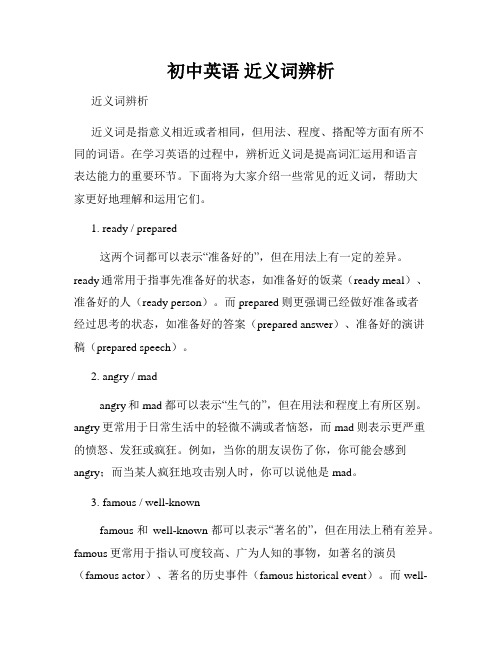
初中英语近义词辨析近义词辨析近义词是指意义相近或者相同,但用法、程度、搭配等方面有所不同的词语。
在学习英语的过程中,辨析近义词是提高词汇运用和语言表达能力的重要环节。
下面将为大家介绍一些常见的近义词,帮助大家更好地理解和运用它们。
1. ready / prepared这两个词都可以表示“准备好的”,但在用法上有一定的差异。
ready通常用于指事先准备好的状态,如准备好的饭菜(ready meal)、准备好的人(ready person)。
而prepared则更强调已经做好准备或者经过思考的状态,如准备好的答案(prepared answer)、准备好的演讲稿(prepared speech)。
2. angry / madangry和mad都可以表示“生气的”,但在用法和程度上有所区别。
angry更常用于日常生活中的轻微不满或者恼怒,而mad则表示更严重的愤怒、发狂或疯狂。
例如,当你的朋友误伤了你,你可能会感到angry;而当某人疯狂地攻击别人时,你可以说他是mad。
3. famous / well-knownfamous和well-known都可以表示“著名的”,但在用法上稍有差异。
famous更常用于指认可度较高、广为人知的事物,如著名的演员(famous actor)、著名的历史事件(famous historical event)。
而well-known则更侧重于广为人知、众所周知的事物,如众所周知的事实(well-known fact)、众所周知的地方(well-known place)。
4. continue / keepcontinue和keep都可以表示“继续”,但在用法上有所区别。
continue常用于指在某种情况下继续进行某个动作,如继续学习(continue studying)、继续工作(continue working)。
而keep则表示保持某种状态或持续进行某个动作,如保持安静(keep quiet)、持续成长(keep growing)。
中考英语近义词辨析
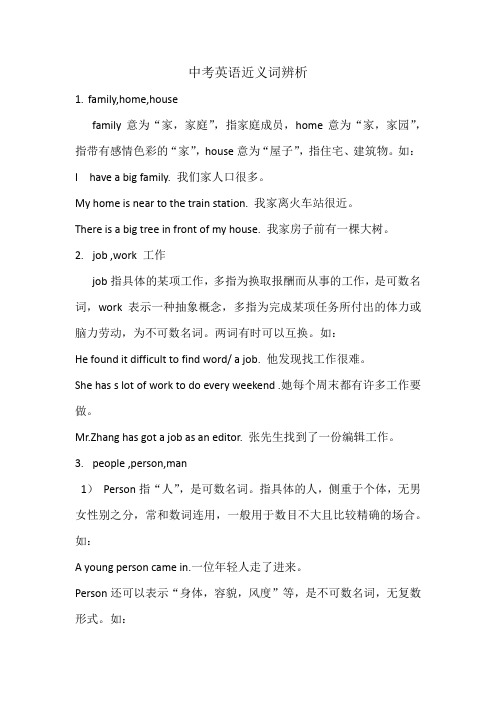
中考英语近义词辨析1.family,home,housefamily意为“家,家庭”,指家庭成员,home意为“家,家园”,指带有感情色彩的“家”,house意为“屋子”,指住宅、建筑物。
如:I have a big family. 我们家人口很多。
My home is near to the train station. 我家离火车站很近。
There is a big tree in front of my house. 我家房子前有一棵大树。
2.job ,work 工作job指具体的某项工作,多指为换取报酬而从事的工作,是可数名词,work表示一种抽象概念,多指为完成某项任务所付出的体力或脑力劳动,为不可数名词。
两词有时可以互换。
如:He found it difficult to find word/ a job. 他发现找工作很难。
She has s lot of work to do every weekend .她每个周末都有许多工作要做。
Mr.Zhang has got a job as an editor. 张先生找到了一份编辑工作。
3.people ,person,man1)Person指“人”,是可数名词。
指具体的人,侧重于个体,无男女性别之分,常和数词连用,一般用于数目不大且比较精确的场合。
如:A young person came in.一位年轻人走了进来。
Person还可以表示“身体,容貌,风度”等,是不可数名词,无复数形式。
如:She is small and neat of person.她长得娇小玲珑。
2)People 泛指“人们”,是集体名词,作主语时谓语动词用复数形式。
如:Some people speak French in this country .在这个国家一部份人讲法语。
The people 意为“人民”如:We study hard for the people.我们为人民努力学习。
初中英语同义词辨析
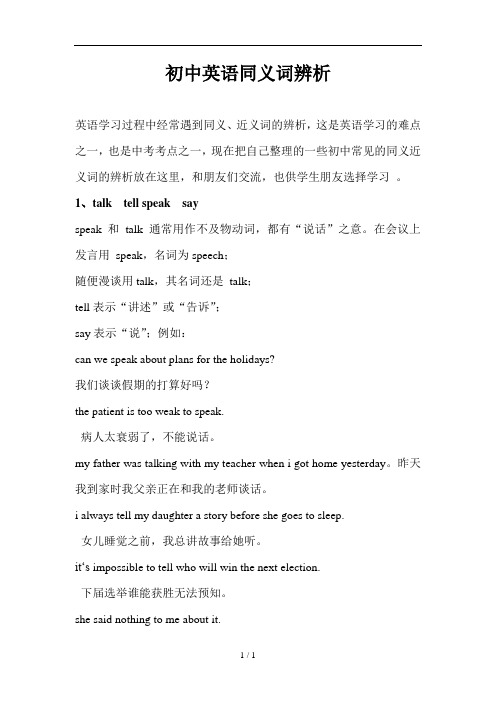
初中英语同义词辨析英语学习过程中经常遇到同义、近义词的辨析,这是英语学习的难点之一,也是中考考点之一,现在把自己整理的一些初中常见的同义近义词的辨析放在这里,和朋友们交流,也供学生朋友选择学习。
1、talk tell speak sayspeak 和talk 通常用作不及物动词,都有“说话”之意。
在会议上发言用speak,名词为speech;随便漫谈用talk,其名词还是talk;tell表示“讲述”或“告诉”;say表示“说”;例如:can we speak about plans for the holidays?我们谈谈假期的打算好吗?the patient is too weak to speak.病人太衰弱了,不能说话。
my father was talking with my teacher when i got home yesterday。
昨天我到家时我父亲正在和我的老师谈话。
i always tell my daughter a story before she goes to sleep.女儿睡觉之前,我总讲故事给她听。
it‘s impossible to tell who will win the next election.下届选举谁能获胜无法预知。
she said nothing to me about it.关于这一点,她什么也没有对我讲。
*speak 当及物动词用时,宾语一般是语言或词语之类的词。
如: does anyone speak english here? 这儿有人会说英语吗?2、good well nicegood 形容词,好的,合适的,新鲜的,擅长的。
well 作形容词时,指"(身体)健康的”;还可用作副词,修饰动词。
nice形容词,美好的,令人愉快的,可爱的,特指取悦感官的事物。
she is good at english.她擅长英语。
this cake tastes good.这蛋糕好吃。
中考英语词汇辨析常考知识点是什么
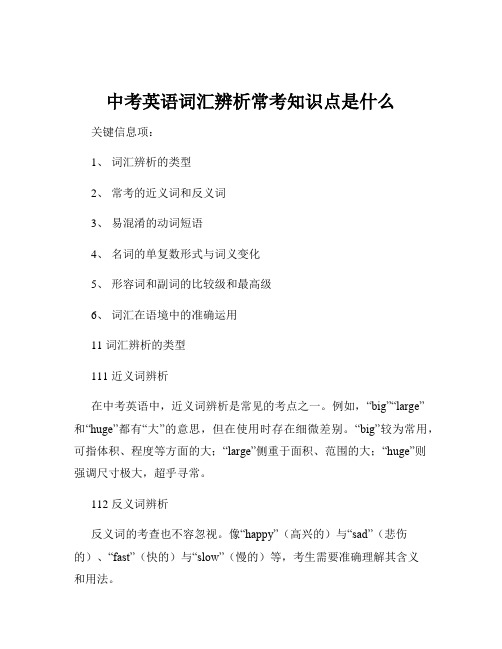
中考英语词汇辨析常考知识点是什么关键信息项:1、词汇辨析的类型2、常考的近义词和反义词3、易混淆的动词短语4、名词的单复数形式与词义变化5、形容词和副词的比较级和最高级6、词汇在语境中的准确运用11 词汇辨析的类型111 近义词辨析在中考英语中,近义词辨析是常见的考点之一。
例如,“big”“large”和“huge”都有“大”的意思,但在使用时存在细微差别。
“big”较为常用,可指体积、程度等方面的大;“large”侧重于面积、范围的大;“huge”则强调尺寸极大,超乎寻常。
112 反义词辨析反义词的考查也不容忽视。
像“happy”(高兴的)与“sad”(悲伤的)、“fast”(快的)与“slow”(慢的)等,考生需要准确理解其含义和用法。
113 形似词辨析一些词汇在拼写和发音上相似,但词义完全不同。
如“quite”(相当)和“quiet”(安静的),“accept”(接受)和“except”(除之外)。
12 常考的近义词和反义词121 常见的近义词“look”“see”“watch”都与“看”有关,但“look”强调看的动作,“see”侧重于看的结果,“watch”则常指观看活动、比赛等。
“spend”“cost”“take”“pay”都有“花费”之意,“spend”主语是人,“cost”主语是物,“take”通常用于“it takes sb some time to do sth”句型,“pay”常与“for”搭配。
122 常见的反义词“good”与“bad”、“right”与“wrong”、“many”与“few”、“much”与“little”等反义词在中考中经常出现,需要考生清晰掌握其用法和区别。
13 易混淆的动词短语131 由“put”构成的动词短语“put on”(穿上)、“put off”(推迟)、“put up”(张贴;举起)、“put away”(收拾好)等,这些短语的含义和用法各不相同。
英语考试中常考的近义词辨析,考前拿来背一背,提分超见效!

英语考试中常考的近义词辨析,考前拿来背一背,提分超见效!在英语学习中有很多常用词和短语意思相近但用法却不同,常常会出现在考试中,很多同学一不小心就会选错或用错,今天小编就为大家总结了这些易错的近义词/词组,这也是高中英语学习的重难点和必考的知识点,希望大家在学习中理解、对比记忆,在考试中千万别用错哦~1、accept, receiveaccept:强调主观意愿决定“接受、收受”。
receive:表示“收到”别人给予(或邮寄、送达)的东西,不含收件人是否愿意接受之义。
He asked me to marry him and I accepted.他向我求婚,我答应了。
I received a phone call from your mother.我接到你妈妈打来的一个电话。
2、matter, affair,eventmatter:通常指客观存在的或有待处理的问题,常用于“a matter of”结构中。
affair:用于描述严肃认真的公共或政治“事务”;也可描述与个人生活密切相关的“小事”。
event:通常指具有很大影响、意义大的事件或运动会的比赛项目。
I always consulted him on matters of policy.我总是向他咨询一些政策问题。
My family is more important to me than political affairs and personal ambition.我的家庭对我来说比政治事务和个人抱负更为重要。
The election was the main event of 2008.那次选举是2008年的重大事件。
3、advise,persuadeadvise:表示“劝告、建议”,可后接双宾语或宾语加补语的复合结构,补语部分可以是动词不定式短语或其他结构。
persuade:不仅有劝告之义,还有使对方接受劝告,即有劝告加说服两重意义,且重点在后者。
中考英语近义词汇及词组辨析

中考英语近义词汇及词组辨析中考英语考试中,近义词汇及词组的辨析是一个很重要的考点。
同学们在备考过程中应该特别注意掌握这些词汇及词组的区别和用法。
本文将为大家介绍一些常见的近义词汇及词组,帮助同学们更好地应对中考英语。
一、accurate与correctaccurate和correct都表示“准确的”。
它们的区别在于:accurate强调准确度的高,而correct则更多地强调符合规范、正确的。
例如:1. The scientist made accurate measurements. (科学家做出了准确的测量。
)2. Please correct your mistakes in the essay. (请在作文中纠正你的错误。
)二、advice与adviseadvice是名词,意为“建议”或“忠告”,而advise是动词,意为“建议”或“提供意见”。
例如:1. Can you give me some advice on how to learn English? (你能给我一些建议如何学习英语吗?)2. I advise you not to be late for the meeting. (我建议你们不要迟到会议。
)三、borrow与lendborrow和lend都与“借”的概念有关,但使用上有所不同。
borrow表示“借入”,lend表示“借出”。
例如:1. Can I borrow your pen? (我能借用你的钢笔吗?)2. Could you lend me some money? (你能借给我一些钱吗?)四、famous与popularfamous和popular都表示“著名的”,但有所不同。
famous更多地指代某个人或事物在广泛的范围内被人所熟知,而popular则更多地指代某个人或事物在大众之间受欢迎。
例如:1. Mozart is a famous composer. (莫扎特是一个著名的作曲家。
中考英语复习 中考常考动词(近义词)辨析
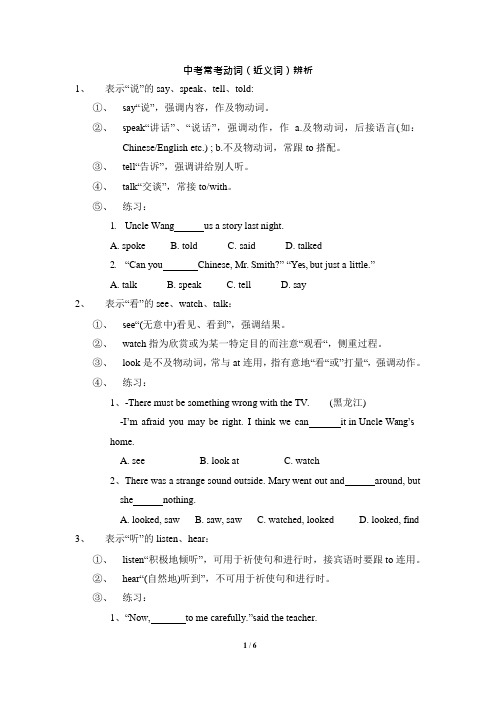
中考常考动词(近义词)辨析1、表示“说”的say、speak、tell、told:①、say“说”,强调内容,作及物动词。
②、speak“讲话”、“说话”,强调动作,作 a.及物动词,后接语言(如:Chinese/English etc.) ; b.不及物动词,常跟to 搭配。
③、tell“告诉”,强调讲给别人听。
④、talk“交谈”,常接to/with。
⑤、练习:1.Uncle Wang us a story last night.A. spokeB. toldC. saidD. talked2.“Can you Chinese, Mr. Smith?” “Yes, but just a little.”A. talkB. speakC. tellD. say2、表示“看”的see、watch、talk:①、see“(无意中)看见、看到”,强调结果。
②、watch 指为欣赏或为某一特定目的而注意“观看“,侧重过程。
③、look 是不及物动词,常与at 连用,指有意地“看“或”打量“,强调动作。
④、练习:1、-There must be something wrong with the TV. (黑龙江)-I’m afraid you may be right. I think we can it in Uncle Wang’shome.A. seeB. look atC. watch2、There was a strange sound outside. Mary went out and around, butshe nothing.A. looked, sawB. saw, sawC. watched, lookedD. looked, find3、表示“听”的listen、hear:①、listen“积极地倾听”,可用于祈使句和进行时,接宾语时要跟to 连用。
②、hear“(自然地)听到”,不可用于祈使句和进行时。
中考英语同义词辨析

中考英语同义词辨析中考英语同义词辨析是考试中的一个重要环节,要求考生能够准确理解并区分不同词汇之间的细微差别。
以下是一些常见的中考英语同义词辨析示例:1、happy 和 joyful:这两个词都表示高兴、愉快的情绪,但程度有所不同。
Happy通常表示一种普通的高兴,而joyful则更加强烈,表示极度的喜悦和欢乐。
2、big 和 large:这两个词都表示大小的概念,但在用法上有所不同。
Big通常用于描述物体的尺寸,而large则更多地用于描述数量或程度。
3、interest 和 interesting:interest既可以作为名词表示兴趣,也可以作为动词表示使……感兴趣。
而interesting则是一个形容词,表示有趣的。
4、sad 和 unhappy:这两个词都表示悲伤、不快的情绪,但侧重点有所不同。
Sad更多地强调情感上的悲伤,而unhappy则更多地强调心理状态的不满和失落。
5、beautiful 和 gorgeous:这两个词都表示美丽的,但程度有所不同。
Beautiful通常表示一种自然的、优雅的美,而gorgeous则更加强烈,表示令人惊叹的美丽。
在进行同义词辨析时,考生需要注意以下几点:理解词义:首先要确保对每个词汇的基本含义有清晰的理解。
掌握用法:了解每个词汇在句子中的位置和用法,以及它们与其他词汇的搭配关系。
比较差异:仔细比较不同词汇之间的细微差别,包括词义、用法、语气等。
多做练习:通过大量的练习来加深对同义词的理解和记忆。
总之,中考英语同义词辨析需要考生具备扎实的词汇基础和敏锐的语言感知能力。
通过不断的练习和积累,考生可以逐渐提高自己的同义词辨析能力。
初中英语2024届中考复习同义词辨析(共30组)
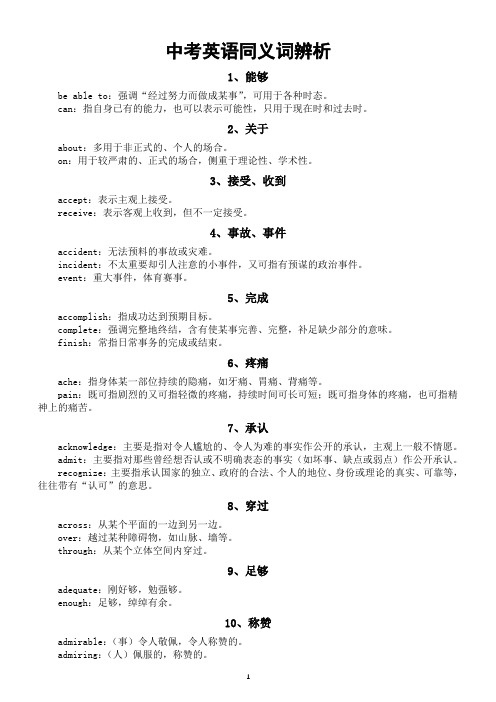
中考英语同义词辨析1、能够be able to:强调“经过努力而做成某事”,可用于各种时态。
can:指自身已有的能力,也可以表示可能性,只用于现在时和过去时。
2、关于about:多用于非正式的、个人的场合。
on:用于较严肃的、正式的场合,侧重于理论性、学术性。
3、接受、收到accept:表示主观上接受。
receive:表示客观上收到,但不一定接受。
4、事故、事件accident:无法预料的事故或灾难。
incident:不太重要却引人注意的小事件,又可指有预谋的政治事件。
event:重大事件,体育赛事。
5、完成accomplish:指成功达到预期目标。
complete:强调完整地终结,含有使某事完善、完整,补足缺少部分的意味。
finish:常指日常事务的完成或结束。
6、疼痛ache:指身体某一部位持续的隐痛,如牙痛、胃痛、背痛等。
pain:既可指剧烈的又可指轻微的疼痛,持续时间可长可短;既可指身体的疼痛,也可指精神上的痛苦。
7、承认acknowledge:主要是指对令人尴尬的、令人为难的事实作公开的承认,主观上一般不情愿。
admit:主要指对那些曾经想否认或不明确表态的事实(如坏事、缺点或弱点)作公开承认。
recognize:主要指承认国家的独立、政府的合法、个人的地位、身份或理论的真实、可靠等,往往带有“认可”的意思。
8、穿过across:从某个平面的一边到另一边。
over:越过某种障碍物,如山脉、墙等。
through:从某个立体空间内穿过。
9、足够adequate:刚好够,勉强够。
enough:足够,绰绰有余。
10、称赞admirable:(事)令人敬佩,令人称赞的。
admiring:(人)佩服的,称赞的。
11、成年人adult:强调法律规定的成年人。
grown-up:指身体发育成熟的人,较口语化。
12、建议advice:为不可数名词,一般指有经验或专长的人提出的带有指点或指教性的“意见、劝告、忠告”。
新人教版中考30组重要近义英语名词辨析

新人教版中考30组重要近义英语名词辨析1. clothes, cloth, clothingclothes 统指各种衣服,谓语动词永远是复数;cloth 指布,为不可数名词,clothing 是服装的总称。
2. incident, accidentincident 指小事件,;accident 指不幸的事故。
例:He was killed in the accident.3. amount, numberamount of 后接不可数名词;a number of 后接可数名词例:amount of money;a number of students4. family, house, homehome指家,包括住处和家人,house 房子,住宅,family 家庭成员。
例:My family is a happy one.5. sound, voice, noisesound 自然界各种各样的声音,voice 指人的嗓音,noise指噪音。
例:I hate the loud noise outside.6. photo, picture, drawingphoto 用照相机拍摄的照片;picture 可指相片,图片,影片;drawing指画的画,主要是素描。
例:Let's go and see a good picture.7. vocabulary, wordvocabulary 指词汇,一个人拥有的单词量;word 指具体的单词。
例:He has a large vocabulary.8. population, peoplepopulation 指人口,人数;people 指具体的人。
例:China has a large population.9. weather, climateweather指一天内具体的天气状况;climate指长期的气候状况。
例:The climate here is not good for you.10. road, street, path, wayroad指具体的公路,马路;street指街道;path指小路,小径;way 指道路,途径例:take this road; in the streetShow me the way to the museum.11. course, subjectcourse 课程(可包括多门科目),subject 科目(具体的学科)例:a summer course12. custom, habitcustom指传统风俗,习俗,也可指生活习惯,后接to do;habit指生活习惯,后接of doing.例:I've got the habit of drinking a lot.13. cause, reasoncause 指造成某一事实或现象的直接原因,后接of sth./doing sth;reason 用来解释某种现象或结果的理由,后接for sth./doing sth.例:the reason for being late14. exercise, exercises, practiceexercise 运动,锻炼(不可数);exercises 练习,操类运动(可数);practice(反复做的)练习。
初中英语人教版中考常考近义词归纳总结(共132组)

英语常考近义词归纳总结1.快乐“假期”(1)vacation n.假期;度假(2)holiday n.假期;假日(3)leave n.假期;休假(4)break n.短期休假;间歇2.各种“方法”(1)way n.方法;方式(2)means n.方式;方法(3)approach n.方法;途径(4)method n.方法3.表示人生各个阶段的名词汇总(1)newborn (出生28天以内的)婴儿(2)baby 婴儿(3)infant 幼儿(4)toddler 刚学会走路的孩子(5)children (10岁以下的)(6)teenager 青少年(13-19)(7)youth 青年(8)youngster 年轻人(9)adult 成年人(10)elder 长者4. “承认;认可”汇总(1)admit vt.承认;准许……进入/加入(2)recognize vt.承认;(正式)认可(3)acknowledge vt.承认(4)approve vt.批准;认可(5)confess vt.承认;坦白5. “感谢”家庭(1)thank v.感谢(2)thankful adj.感激的(3)grateful adj.感激的(4)gratitude n.感激(5)appreciate vt.感激(6)appreciation n.感激6.“事情”荟萃(1)thing n.单一的事情(2)event n.重要事情;大事(3)incident n.不平常的事件(4)matter n.事情;情况(5)accident n.事故;意外事件(6)affair n. 事情7.“害怕”百态(1)afraid adj.害怕的;恐惧的(2)fearful adj.担心的;害怕的(3)frightened adj.受惊的;害怕的(4)scared adj.害怕的(5)terrified adj.非常害怕的;极度惊恐的8.“v.+-er”表示主动者;“v.+-ee”表示被动者(1)examiner n.考官;主考人examinee n.应试者(2)employer n.雇主employee n.雇员(3)trainer n.教练员trainee n.受训者(4)interviewer n.面试者;主考官interviewee n.被面试者9.变b/be为p再加-tion构成名词(1)absorb→absorption 吸收(2)describe→description 描述(3)subscribe→subscription 订阅(4)prescribe→prescription 处方10.“盼望;期望;渴望”聚焦(1)look forward to盼望(2)be anxious/eager for 渴望(3)be dying for/to do...想要……(4)long for/to do...渴望……(5)be thirsty/hungry for 渴望11.注意下列短语中不同的介词(1)be similar to和……相似(2)be the same as和……一样(3)be different from和……不同(4)be identical to 和......相同12.立刻;马上(1)right away/now(2)at once(3)in no time(4)immediately(5)straight away13.喜爱;喜欢(1)care for(2)go in for(3)fall in love with(4)lose one’s heart to14.总览表示“物质存在形式”的词(1)gas n.气体(2)liquid n.液体(3)solid n.固体15.“电”家族集会(1)electric adj.用电的;带电的(2)electrical adj.与电有关的(3)electricity n.电;电流(4)electronic adj.电子的16.大“气”全接触(1)oxygen n.氧气(2)hydrogen n.氢气(3)carbon dioxide n.二氧化碳(4)nitrogen n.氮气(5)atmosphere n.大气层17.事实上;实际上(1)as a matter of fact(2)in fact(3)in effect(4)in reality(5)actually18.掌握“常见疾病”(1)cold n.感冒(2)cough n.咳嗽(3)flu n.流感(4)fever n.发烧19.“后加-ache”名词小结(1)headache头疼(2)toothache牙疼(3)backache背疼(4)stomachache胃疼20.盘点“身体部位名词用作动词”的单词(1)head v.朝……方向前进(2)face v.面对(3)eye v.注视;观看(4)hand v.传递(5)arm v.武装;装备(6)back v.支持;后退(7)shoulder v.肩负21.常见的“以-ly结尾的形容词”小结(1)lively活泼的(2)likely可能的(3)lovely可爱的(4)lonely孤独的(5)friendly友好的22.“v.+ant”名词全接触(1)assist→assistant助手(2)account→accountant会计(3)inhabit→inhabitant居民(4)participate→participant 参与者(5)serve→servant仆人23.“着迷”短语万花筒(1)be/get/become addicted to对……上瘾;沉迷于……(2)be crazy about 迷恋;热衷于……(3)abandon oneself to 沉湎于……(4)be keen on对……着迷(5)be obsessed with 对……着迷24.除了(1)apart from(2)besides(3)as well as(4)in addition to(5)but(6)except25.“加后缀-ician”名词集结(1)musician 音乐家(2)physician 内科医生(3)politician 政治家(4)technician 技术员(5)electrician 电工26.“无进行、无被动”短语汇总(1)belong to属于(2)take place发生(3)consist of由……构成(4)break out爆发(5)come about发生(6)break down出故障27.既可表示单数也可表示复数的集合名词(1)audience 观众(2)family 家庭;家人(3)team 队伍(4)class 班级(5)committee 委员会28.“go+adj.”短语汇总(1)go bad变质(2)go wrong出毛病(3)go deaf变聋(4)go blind失明(5)go mad变疯29.因为;由于(1)as a result of(2)as a consequence of(3)in consequence of(4)because of(5)owing to(6)due to(7)on account of(8)thanks to30.各种“忍受”(1)stand v.容忍(2)bear v.忍受;承担(3)tolerate v.容忍;容许(4)endure v.忍耐;忍受(5)put up with容忍;忍受31.“-ity名词”荟萃(1)reality现实(2)equality平等(3)popularity流行;普及(4)security安全32.名词后加-tic构成形容词(1)drama→dramatic 戏剧性的(2)reality→realistic现实主义的(3)energy→energetic精力充沛的(4)fantasy→fantastic极好的;美妙的33.保护(1)protect(2)shelter(3)preserve(4)conserve(5)defend(保卫)34.阻止......做某事(1)keep...from...(2)stop...from...(3)prevent...from...(4)ban...from...(5)forbid...from...(forbid...to do sth更常用)35.“太空”相关词汇集合(1)alien n.外星人(2)universe n.宇宙(3)spaceship n.宇宙飞船(4)spaceman n.太空人;宇航员(5)astronaut n.宇航员(6)cosmonaut n.宇航员(俄罗斯)(7)capsule n.太空舱(8)orbit n.轨道36.“总共;总计”短语汇总(1)in all总共;总计(2)in total总共;总计(3)add up to加起来总共(4)sum up 计算……的总数37.盘点“很高兴做某事”(1)be delighted to do sth(2)be glad to do sth(3)be happy to do sth(4)be pleased to do sth(5)have fun doing sth38. “地理”词汇大集合(1)ocean n.海洋(2)island n.岛屿(3)plain n.平原(4)continent n.大陆;大洲(5)plateau n.高原39.“表情”单词集锦(1)look n.面部表情;外貌(2)face n.脸;表情(3)expression n.表情(4)appearance n.外表40.不同“位置”(1)place n.地方;场所;位置(2)site n.场所;地方;遗址(3)position n.位置;方位(4)location n.场所;地点;位置(5)situation n.位置;形势;局面41.发生(vi. 不被动)(1)happen(2)take place(3)occur(4)come about(How did it come about that...)(5)break out(战争、疾病等爆发)42.突然想到......(1)It occurs/occurred to sb that...(2)It hits/hit sb that...(3)It strikes/struck sb that...(4)It comes/came to sb that...(5)It crowds/crowded in on sb that...(6)It flashes/flashed into sb that...43.“v.+sb+of sth”短语:cure sb of sth 治好某人的病accuse sb of sth 指控某人某事warn sb of sth 警告某人某事inform sb of sth 通知某人某事convince sb of sth 使某人相信某事rob sb of sth 抢劫某人某物suspect sb of sth 怀疑某人某事ease/rid sb of sth 使某人摆脱某事persuade sb of sth 使某人信服cheat sb of sth 骗走某人某物44.带介词to的短语:look forward to期待;期望;期盼be used / accustomed to 习惯于be addicted to 沉溺于stick to 坚持belong to 属于add to 增加devote...to 献身于;致力于adapt to 适应object to 反对=be opposed torefer to 谈到get down to 开始做lead to 导致contribute to 有助于turn to 求助于;转向keep to 遵守45.条条大“路”(1)highway n.公路(2)railway n.铁路(3)railroad n.铁路(4)freeway n.高速公路(5)expressway n.高速公路46.“名词+-y变为形容词”高频词汇扫描(1)cloud→cloudy 多云的(2)wealth→wealthy 富裕的(3)health→healthy 健康的(4)thirst→thirsty 渴的(5)anger→angry 生气的(6)hunger→hungry 饥饿的47.“收入”面面观(1)income n.收入(2)pay n.报酬(3)salary n.(按月发的)薪水(4)wage n.(按周领的)工资(5)pension n.养老金;退休金48.“地质灾害”汇总(1)earthquake n.地震(2)flood n.洪水(3)drought n.干旱(4)tsunami n.海啸(5)landslide n.滑坡49.“气象灾害”集合(1)storm n.暴风雨(2)snowstorm n.暴风雪(3)thunderstorm n.雷暴(4)tornado n.龙卷风(5)hurricane n.飓风50.“打”得各式各样(1)hit v.打击;袭击(2)beat v.敲击;打败(3)tap v.轻敲;轻拍;轻打(4)knock v.敲;打;敲击(5)strike v.敲击;打击51.“积极”与“不积极”(1)active adj.积极的;主动的→passive adj.被动的;消极的(2)positive adj.积极的;肯定的→negative adj.消极的;否定的(3)optimistic adj.乐观的;积极的→pessimistic adj.悲观的;厌世的52.1.“前缀fore-”常见词一览(1)foresee v.预见;预知(2)forecast v.& n.预测;预报(3)foretell v.预言;预示(4)forehead n.前额(5)foreground n.(图画或照片的)前景53.“后缀-th”高频名词集锦(1)warmth 温暖(2)depth 深度(3)length 长度(4)strength 力量;力气(5)faith 信念;信仰54.“努力做某事”汇总(1)try/do one’s best to do sth(2)do what sb can to do sth(3)make efforts/every effort to do sth(4)go all out to do sth55.“在某人看来”的多种表达(1)in one’s opinion(2)in one’s view(3)from one’s point of view(4)as for sb(5)as far as sb be concerned56.靠......为生(1)exist on(2)survive on(3)live on(4)feed on57.“对……有影响”短语集合(1)have an effect on(2)have an influence on(3)have an impact on58.“简言之”大团圆(1)in a/one word(2)all in all(3)in short/brief(4)to be brief/short(5)in a nutshell“总之”(1)in conclusion(2)all in all(3)on the whole(4)to sum up59.“被困住”家庭(1)be/get caught in(2)be/get stuck in(3)be/get trapped in60.“看”过来(1)see v.看到;看见(2)look v.看(3)watch v.观看;注视(4)notice v.注意到(5)observe v.观察61.位于;坐落于(可根据后面所接宾语选择适当的介词,如in、on等)(1)lie in(2)stand in(3)be located in(4)be situated in62. have a +n.+of...结构(1)have a population of ... 有......人口(2)have a history of... 有......历史(3)have an area of...有......面积(4)have a distance of...有.....距离63.导致(1)cause(2)result in(3)contribute to(4)bring about64.“允许;禁止”相关词汇荟萃(1)allow v.允许(2)permit v.允许;许可(3)forbid v.禁止(4)ban v.禁止(5)prohibit v.禁止65.“提供;给予”常见词一览(1)give v.给予+sb. sth/sth to sb(2)offer v.主动提供+sb sth/sth to sb(3)provide v.提供+sb with sth/sth for sb(4)supply v.供应+sth to sb/sb with sth 66.厌烦;厌倦(1)be bored with(2)be fed up with(3)be tired of(4)be sick of67.确信(1)be sure of sth/that...(2)be confident of sth/that...(3)be certain of sth/that...(4)be convinced of sth/that...68.“证书”家族(1)permit n.许可证(2)license n.许可证;执照(licence)(3)certificate n.证明书(4)diploma n.文凭;毕业证书69.各种“费用”(1)fee n.费用;服务费;酬金;会费(2)cost n.价钱;成本;费用(3)expense n.花费;费用(4)charge n.费用;价钱(5)fare n.车费;船费;飞机票价70.使某人/某事......(1)make/let ...do/done(2)have...do/done/doing(3)get...to do/done/doing71. “静”系列(1)calm adj.平静的;冷静的(2)cool adj.冷静的(3)quiet adj.安静的(4)still adj.静止的(5)silent adj.沉默的72.“动词加-ence变为名词”大聚会(1)exist→existence存在(2)refer→reference参考(3)differ→difference不同(4)prefer→preference偏好73.表示“(做)……的方法”的短语:the approach to (doing) sththe way to do / of doing sththe means of doing sththe method of doing sth表示“以这种方法”的短语:in the wayby the meanswith the method74.“帝王”家族(1)emperor n.皇帝(2)empress n.皇后(3)king n.国王(4)queen n.王后(5)prince n.王子;亲王(6)princess n.公主;王妃75.各种“可能”(1)likely adj.可能的(2)possible adj.可能的(3)probable adj.很可能的(4)unlikely adj.不可能的(5)impossible adj.不可能的76.“后缀-ify”动词小结(1)simplify 简化(2)identify 确定;识别(3)beautify 美化(4)purify 净化(5)terrify 使害怕(6)clarify 澄清;阐明77.“-ist”表示“……家”词汇搜索(1)artist n.艺术家(2)scientist n.科学家(3)pianist n.钢琴家(4)violinist n.小提琴家(5)physicist n.物理学家(6)linguist n.语言学家(7) socialist n.社会主义者(8)chemist n.化学家;药剂师(9)biologist n.生物学家(10)economist n.经济学家(11)geologist n.地质学家(12)journalist n.记者;新闻工作者(13)psychologist n. 心理学家78.推迟(1)put off(2)delay(3)postpone79.“后缀-ial”高频形容词扫描(1)facial 面部的(2)official 官方的;正式的(3)beneficial 有利的;有益的(4)essential 必不可少的(5)financial 财政的;金融的80.“满意的”一览(1)pleasing adj.令人满意的(2)pleased adj.高兴的;满意的(3)satisfying adj.令人满意的(4)satisfied adj.满意的(5)satisfactory adj.令人满意的(6)content adj.满意的;满足的81.“人员”集合(1)worker n.工人(2)staff n.全体职员;员工(3)employee n.雇员;雇工(4)clerk n.职员;办事员(5)personnel n.人事部门;职员82.“in+n.+to”短语(1)in response to作为……的回应(2)in reply to对……回复(3)in addition to除……之外(4)in regard to关于;对于(5)in contrast to与……相比83.“发明创造”大全(1)make vt.制造(2)invent vt.发明(3)create vt.创造(4)manufacture vt.生产;制造(5)design vt.设计84.“惊恐”一览(1)frighten vt.使惊恐(n. fright)(2)terrify vt.使恐惧(n. terror)(3)panic vt.恐慌(p. panicked)(4)scare vt.&n.惊吓(adj. scared;scary)(5)shock vt.&n.使震惊85.“雨”词汇串联(1)pour vi.(雨)倾盆而下(2)rainfall n.降雨量(3)rainstorm n.暴风雨(4)acid rain n.酸雨86.“一......就......”结构(1) as soon as(2)hardly/barely/scarcely/rarely...when...; no sooner....than...(3)instantly; immediately; directly(4)the moment; the minute; the second; the instant(5)on+n/doing87.显著的;非凡的(1)remarkable(2)extraordinary88.显而易见的(1)clear(2)obvious(3)apparent(4)evident89.各种“预订”(1)book vt.预订(2)order vt.订购(3)reserve vt.预订;预留(4)reservation n.预订;预留90.“运送”词汇大集合(1)transport vt.运输;运送(2)convey vt.传达;运送;输送(3)deliver vt.投递;递送(4)ship vt.(用船)运送91.“走”来“走”去(1)walk v.散步;步行(2)wander vi.漫步;闲逛(3)crawl v.爬行;匍匐前进(4)rush v.冲;闯(5)march v.行军;前进92.“扩张;扩大”词汇扫描(1)extend v.延长(2)expand v.扩大;扩展(3)enlarge v.扩大(4)broaden v.变宽93.“体育”相关词汇全接触(1)athletics n.田径运动(2)stadium n.体育场(3)track n.跑道(4)tracksuit n.运动服(5)trainer n.运动鞋;教练员(6)sportswear n.运动服(7)gymnast n.体操运动员(8)champion n.冠军(9)gym n. 体育馆94.“球类”集合(1)basketball n.篮球(2)football n.足球(soccer)(3)baseball n.棒球(4)table tennis n.乒乓球运动(5)rugby n.橄榄球运动(6)volleyball n. 排球(7)tennis n. 网球(8)badminton n. 羽毛球95.life短语一览(1)all one’s life一生;终生(2)lead/live a...life 过着……的生活(3)bring...to life 使…苏醒;使…生动起来(4)come to life 复活;复苏;变得活跃(5)give one’s life to 为……献身96.“将......视为......”结构(1)regard...as...(2)think of...as...(3)consider...as....(4)look on ...as...97. “肯定的”汇聚(1)sure adj.确定的;肯定的(2)certain adj.肯定的;确定无疑的(3)positive adj.积极的;肯定的(4)definite adj.肯定的(5)guaranteed adj.有保证的98. lead短语聚会(1)lead to通向;导致(2)take the lead带头;领先(3)in the lead处于领先地位(4)lead the way带路;领路(5)lead sb by the nose牵着某人的鼻子走99.“in+n.”短语集结(1)in addition除此之外;另外(2)in conclusion 总之;最后(3)in danger处于危险中(4)in peace平静地(5)in power当权100.加前缀in-变为反义词的形容词(1)correct→incorrect(2)direct→indirect(3)formal→informal(4)capable→incapable(5)visible→invisible101.“出现;消失”家族(1)appear v.出现;露面(2)disappear v.消失(3)vanish v.消失(4)fade v.褪色;逐渐消失102.“责备;表扬”相关词汇大观园(1)blame v.& n.责备(2)scold v.责备;申斥(3)criticize v.批评;指责(4)praise v.表扬;赞扬(5)compliment n.恭维;赞美103.raise形近词集锦(1)rise vi.上升;起立(2)arise vi.出现;上升(3)rouse vt.唤醒;激发(4)arouse vt.引起;唤醒;激发104.term短语万花筒(1)in terms of在……方面(2)in the long term长期而言(3)in the short term短期而言(4)(be) on good terms with与……关系好(5)(be) on bad terms with与……关系不好105.“be+过去分词 +prep.”高频短语(1)be tired of厌烦……(2)be faced with面临;面对(3)be connected with与……有关(4)be involved in卷入;涉及(5)be combined with 与……相结合106.“缩小”万花筒(1)reduce v.缩小;减少(2)reduction n.缩小;减少(3)decrease v.降低;使减少(4)shrink v.(使)缩小;(使)收缩107.“处理”全接触(1)deal v.处理;对待(2)handle v.应付;处理(3)treat v.处理;治疗(4)conduct v.进行;处理(5)manage v.设法完成;处理108.“美德”相关词汇一览(1)virtue n.美德(2)faith n.忠诚(3)justice n.正义(4)bravery n.英勇(5)diligence n.勤奋109.suspect形近词大丰收(1)suspect v.怀疑(2)inspect v.视察;检查(3)respect v.& n.尊敬;尊重(4)aspect n.方面110.变“-t”为“-ce”成名词的词全扫描(1)important→importance 重要(2)different→difference 不同(3)confident→confidence 信心(4)distant→distance 距离(5)elegant→elegance 优雅(6)patient→patience 耐心(7)diligent→diligence 勤奋111.“选择”种种(1)choose v.选择(2)choice n.选择(3)select v.挑选;选拔(4)pick v.挑选;采摘(5)elect v.推选;选择;选举(6)election n.推选;选择;选举112.盘点后缀-ship高频词(1)friendship n.友谊(2)hardship n.苦难(3)partnership n.伙伴关系(4)ownership n.所有权(5)scholarship n.奖学金113.“获得”大聚会(1)get v.获得;得到(2)gain v.& n.获得;得到(3)obtain v.获得;得到(4)acquire v.获得;得到(5)attain v.获得;达到114.由able所想到的(1)able adj.有能力的(2)ability n.能力(3)enable v.使能够(4)disable v.使丧失能力(5)capable adj.有能力的;能胜任的115.if necessary 相似短语小结(1)if necessary 如果必要的话(2)if possible 如果可能(3)if any 如果有(4)if ever 如果曾经有过(5)if so 如果是这样(6)if not 不然;要不116.history短语小聚(1)in history 在历史上(2)in the history of 在……的历史上(3)make history 载入史册117.“后缀-ous”高频形容词一览(1)famous 出名的(2)dangerous 危险的(3)humorous 幽默的(4)courageous 勇敢的(5)generous 慷慨的(6)ambiguous 模糊不清的118.学会“适应”(1)fit v.使适应;安装(2)suit v.适合;使适应(3)adjust v.调整;使适应(4)adapt v.使适应;改编(5)accommodate v.(使)适应;容纳119.“后缀-ity”名词汇总(1)minority 少数(2)majority 多数(3)equality 平等;相等(4)identity 身份;同一性(5)gravity 重力;地心引力120.fool相关词汇扫描(1)foolish adj.傻的(2)stupid adj.愚蠢的(3)silly adj.傻的(4)idiot n.白痴121.全面“保护”(1)protect v.保护;防护(2)protection n.保护;防护(3)preserve v.保护;保存(4)defend v.辩护;防护;保卫(5)defence n.辩护;防护;保卫(6)guard v.保卫;监视122.to为介词的短语汇总(1)contribute to导致;有助于(2)object to 反对(3)lead to 导致(4)refer to 参考;指(5)stick to 坚持123.try短语万花筒(1)try out 尝试(2)try to do 努力做(3)try doing 试着做(4)try one’s best 尽某人最大努力(5)try sth on 试穿124.后缀“-ent”高频词一览(1)different 不同的(2)dependent 依靠的;依赖的(3)existent 存在的(4)absorbent 易吸收的(5)consistent 一致的;始终如一的125.“主要的”一览(1)main adj. 主要的;怕最重要的(2)major adj. 主要的;主修的(3)chief adj. 主要的;首席的(4)leading adj. 领导的;主要的(5)primary adj. 主要的;初级的126.“丰富”大会(1)rich adj. 富有的;丰富的(2)abundant adj. 丰富的;充裕的(3)ample adj. 丰富的;足够的(4)full adj. 满的;丰富的127.“前缀trans-”高频词全接触(1)transform v. 转变;改变(2)transfer n. 转让;转移(3)translate v. 翻译(4)transport v.&n.运输;运送(5)transparent adj. 透明的128.种种“反对”(1)oppose v. 反对(2)opposed adj. 反对的(3)against prep. 反对;违反(4)object v. 反对;不赞成(5)disapprove v. 不赞成129.“悲伤”家族(1)sad adj. 悲伤的;难过的(2)sadness n. 悲哀;难过(3)sorrow n. 悲伤;悲痛(4)sorrowful adj. 悲伤的(5)grief n. 悲痛;忧伤130.“控告”词汇一览(1)accuse v. 指控;控告(sb. of...)(2)charge v. 指控(sb. with...)(3)complain v. 抱怨;控诉(about...)(4)sue v. 控告;请求131.“揭露与隐藏”相关词汇(1)hide v. 隐藏(2)mask v. 掩饰;戴面具(3)discover v. 发现(4)uncover v. 揭露;发现(5)expose v. 使暴露;接发(6)reveal v. 揭示;揭露132.“大量的”高频短语(1)a good/great/huge number of+pl.(2)a great/good many+pl.(3)a great deal of +un.(4)a large amount of +un.(5)a large quantity of+un./pl.(6)plenty of +un./pl.。
中考英语常考近义词语辨析_人教新目标版.doc
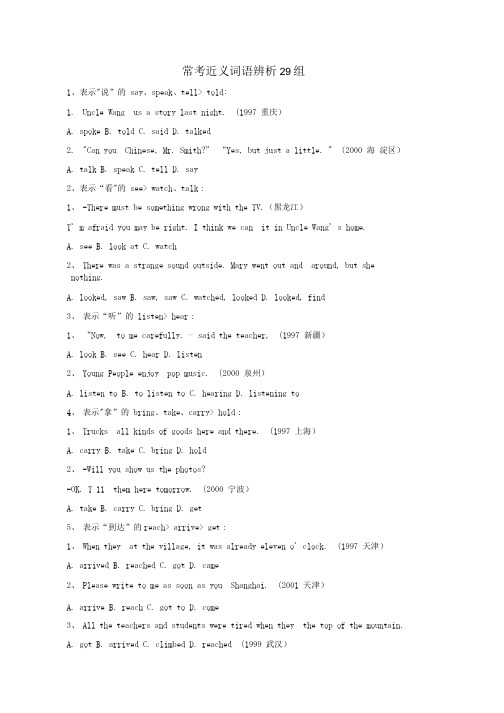
常考近义词语辨析29组1、表示"说”的say、speak、tell> told:1.Uncle Wang us a story last night. (1997 重庆)A. spokeB. toldC. saidD. talked2."Can you Chinese, Mr. Smith?” “Yes, but just a little. " (2000 海淀区)A. talkB. speakC. tellD. say2、表示“看"的see> watch、talk:1、-There must be something wrong with the TV.(黑龙江)T' m afraid you may be right. I think we can it in Uncle Wang' s home.A. seeB. look atC. watch2、There was a strange sound outside. Mary went out and around, but shenothing.A. looked, sawB. saw, sawC. watched, lookedD. looked, find3、表示“听”的listen> hear:1、“Now, to me carefully. ,, said the teacher, (1997 新疆)A. lookB. seeC. hearD. listen2、Young People enjoy pop music. (2000 泉州)A. listen toB. to listen toC. hearingD. listening to4、表示"拿”的bring、take、carry> hold:1、Trucks all kinds of goods here and there. (1997 上海)A. carryB. takeC. bringD. hold2、-Will you show us the photos?-OK. T 11 them here tomorrow. (2000 宁波)A. takeB. carryC. bringD. get5、表示“到达”的reach> arrive> get:1、When they at the village, it was already eleven o' clock. (1997 天津)A. arrivedB. reachedC. gotD. came2、Please write to me as soon as you Shanghai. (2001 天津)A. arriveB. reachC. got toD. come3、All the teachers and students were tired when they the top of the mountain.A. gotB. arrivedC. climbedD. reached (1999 武汉)6、表示“借"的borrow、lend> keep:1、Will you me your pencil? Mine is broken. (1996 成都)A. borrowB. lendC. take2、-How long can the book , Miss Gao?-For two weeks, I think. (2000 宁波)A. borrowB. be borrowedC. keepD. be kept7、no one none nothing1.knows what has happened to him. of us has seen him.2.likes a person with bad manners.3.“How many birds are there in the tree?" " ."4.“Who are you speaking to?" " ."5.“What' s in the bo x?" " ."6.of the fruit is delicious.7.Will you give me some water? There is in the cup.8.so such1.This book is ___ interesting that I have read it twice.2.Don' t be in ___ a hurry.3.He is a kind person that we all like him.4.I hope never to have another experience.5.There are no words as those in the dictionary.6.This is expensive a car that I can' t afford it.(改写)9.very quite much rather1.This room is clean.2. It takes a long time.3.It takes a long time.4.I agree with you.5. I'm sorry to hear that.7.Math is too difficult to me.8.It is colder today than yesterday.9.I don' t like football .10.Eating too sugar is bad for your teeth.10、leave away1.The train five minutes ago.2.The train has for five minutes.3.How long you from school last term?4.That small town is about five kilometers .11> leave (left) forget1.Sorry I my homework at home2.I to bring my homework to school.3.The woman all her things in that restaurant.12> leave stay1.She has to go out but she can' t her son by himself.2.He is ill and he has to at home.3.There is little time . Hurry up!13、in the end at the end by the end to the end1.How many English words had you learned the end of last year?2.They went to visit the museum the end of last month.3.Go up this road the end.4.the end of the road you' 11 find the hospital.5.He tried many ways of making money and the end he became a businessman.6.The war lasted four years. ____ the end the North won.7.We will have graduated from junior middle school the end of this June.14、marry get married be married1.She a man with a lot of money.2. A famous football player her.3.Tom and Mary last year.4. Tom and Mary has for a year. 5*Tom has been married Mary for a year.15、a number of the number of1.number of pages in this book (be) two hundred.2.number of students gone to watch traffic.3.There are number of people over there, watching the traffic accident.4.Which language is spoken by the number of people in the world?(最多)16、make somebody do something be made to do something1.The tiger made one of the smaller animals (bring)food to him.2.He often tells jokes to make people (laugh).3.The boss made the workers (work) fourteen hours a day.4.The workers were made (work) fourteen hours a day.17> mean to do mean doing1.I didn' t mean (quarrel) with you.2.Love means (give).3.I really mean (do) it. It is important for me.4.Being lazy means (fall) behind others.18> few a few little a little1.Is there any milk in the bottle? Yes, there is .2.Sorry I can' t answer your question. I know about this subject.3.That film is not interesting, so people like it.4.Do you speak Japanese? Yes, but only .5.I' ve studied Japanese for only months.6.Tom was ill yesterday, but he feels better now.7.All the students are busy, so of them will go to the cinema.8.Mr. White is very lonely. He has friends. But he likes dogs and he has in his house. He says his dogs eat much and drink _.9.He is a man of words, that is, he talks little.10.In the past years, there have been a lot changes in my hometown.11* There is milk in this glass than in that one.12* I picked apples than you. But mine is better than yours.19、another the other other others1.I don' t like this one. Will you show me one?2.All her friends are waiting outside the door.3.There are three books on the desk. One is mine, ____ two are yours.4.Would you like piece of cake?5.The post office is on side of the street.6.He will stay there for three days and come back next Monday.7.There are many visitors in the park. Some are riding camels,are taking photos.8.Many students are in the classroom. Some are cleaning the windows,are sweeping the floor.9.You mustn, t lend this book to . You can read it yourself.10.We had fish, chicken, seafood and some _____ delicious food for dinner.11.___ three bottles of beer, please. Three bottles of beer, please.20> in front of in the front of in front1.The teacher is standing the classroom, giving a lesson to us.2. A lot of cars are parking the school when there is a parents meeting.3.Six students are standing the class.4.The driver was driving the bus when he saw a cow _ the bus.5.There is a tall tree the house.6.On the first lap, Class 3 is .21、in the evening on the evening1.We usually do our homework the evening.2. the evening of October 5 th, I saw a car run into the river.3. a summer evening when he was on his way home, a big dogwas following him.4.This story happened a cold evening of January 1999.22> mustn, t needn' t don' t need don' t have to won' t have to doesn' t have to1.You _ take this book out of the library. You can read it here.2.Must I do my homework now? No, you .3.Do I have to finish the work today? No, you .4.You must help your mother with the housework, you?5.Need you go to see a doctor? No, I .6.You can go home now. You to clean the classroom.23、careful carefully care1.You must be more . That car nearly hit you.2.We must listen to the teacher in class.3.She is a girl and does everything .4.You must take good of your things. Put them away.5.Take , and wish you a good journey home.24、how long how often how soon how far how many times1.How did the film last?2.“H ow can you be ready?" "In a few minutes."25、take spend pay cost1.It often me a quarter of an hour to go to school by bike.2.I often a quarter of an hour to school by bike.3.It them three hours to hike to the top of the mountains last month.4.They half a year ________ building the bridge last year.5. 1000 dollars on this $1000 for thisused car.7.This old car ___ me 1000 dollars. 8. How much did it you?9.How long does it to get to the moon by spaceship?10.This diamond necklace 2000 yuan.11.He his holiday in his hometown.26、hope wish1. you good luck with your English.2. you success.3.Mr Smith to visit China in the future.4.I you to have a good time in America.5.I that you have a good time in America.6.I I could fly like a bird.7.I don' t know Russian. I I knew Russian now.8.I I could help you, but I' m very busy really.27、be good at be good for be good to1.He was very good when I was ill.2.All the teachers are good __ us at school.3.Sunshine is good your plants.4.Sports are good __ our health.5.He is good playing basketball.28、wear put on in dress dress up1. You look beautiful this dress.2. Alice is her doll.3.As soon as he received the letter, he his glasses and read it.4.Could you the children for me?5.My daughter is old enough to herself.6.After I get up, I usually get quickly.7.The lady white teaches us physics.8.Many girls skirts in simmer time.9.She a red flower in her head.10.When he learned the news, he quickly his coat and his hat, and then went out.29、would like feel like be like look like1.I feel terrible, and I don' t eating anything.2.I to go to your party tomorrow, but I will be busy then.3.Is your daughter lost? Tell me what she ?4.Do you know what the weather will the day after tomorrow?5.Do you taking a walk with me?6."What ___ he ?" "He is very kind."7.“What does he ?" "He is young, handsome and strong."8.I you to come to my home for dinner this evening.。
初中升高中必背常用高频近义词短语辨析

中考英语考前能力突破必背〔全国通用〕中考英语常用高频近义词〔短语〕辨析20211 cothe, coth, cothingcothe统指各种衣服,谓语动词永远是复数,coth指布,为不可数名词cothing 服装的总称,指一件衣服用a e unti 3:00185 beide, eceeIf he come, I' et ou now187 and, orand并且,or或者,否那么,常用于否认句中例如:I don't ie ai the bu188 becaue, ince, a, for原因由强到弱为:becaue, ince/a, for 在句中的位置如下:1...becaue (2)Since/a…, …3)…, for…例如:Since I wa i, I didn't go189 when, a, whie 表时间when从句动词点动词,持续性动词均可,a重在表示动作同时发生,伴随进行,whie从句动词为持续性动词例如:Whie I ee…a, the ame…thatthe ame…a和…一样的〔相似但不同一〕,the ame…that同一物体例如:Thi i the ame193 becaue, becaue ofbecaue连词,连接两句话,becaue of介词短语,后接词或短语例如:He didn't go to choo becaue of hi ine194 in order that, in order to表目的,in order that后接句子,in order to后接动词原形例如:I got uerican citie, uch a New Yor, Atanta and Chicago196 ued to, woud表过去常常,和现在相对应用ued to,不提现在用woud例如:I ued to get uan, much, itte, few修饰用o…that,不用uch that 例如:o man e---Ye, I wi。
中考英语中常考几组近义词辨析.doc

中考英语中常考几组近义词辨析on表示在--物体上,强调两物相接触,over也表示在一物体上,但强调覆盖这一物体。
试比较:%1She put her coat on the bed.她把大衣放在床上。
%1She put her coat over the sleeping baby.她把大衣盖在那正在睡觉的孩了身上。
%1There's a magazine lying open on the tabic.桌上有木杂志翻开着。
©There's a cloth over the table.桌上摊着一块台布。
%1The woman lifted a big jar on her head.那位妇女头上顶着一只大坛了。
%1She put her hands over her ihce.她用手遮住脸。
over表示“越过”某一高度,具有动态Z意,on仅表示“处于 . 之上”,是静态。
试比较:%1They dragged heavy stones with ropes over their shoulders.他们肩背绳索拖拽巨冇。
(绳在肩膀两边弯下去,不用on。
)%1To my horror, I saw, over my father's shoulder, a gorilla, the worst enemy of the soldier in Africa.使我感到恐怖的是,从我父亲的肩膀上看过去,我发现非洲士兵最危险的敌人——一只大猩猩。
(视线越过肩膀后,一直向前方延伸,不用on.)%1The farmers walked to their fields with hoes on their shoulders.农民们肩上扛肴锄头,向田地走去。
(仅表示锄头所处的位置。
是静态,用on,不用over.)over•和above都可以用来表示“高于”,相当于“higher than”。
- 1、下载文档前请自行甄别文档内容的完整性,平台不提供额外的编辑、内容补充、找答案等附加服务。
- 2、"仅部分预览"的文档,不可在线预览部分如存在完整性等问题,可反馈申请退款(可完整预览的文档不适用该条件!)。
- 3、如文档侵犯您的权益,请联系客服反馈,我们会尽快为您处理(人工客服工作时间:9:00-18:30)。
常考近义词语辨析29组1、表示“说”的say、speak、tell、talk:1. Uncle Wang _____ us a story last night. (1997 重庆)A. spokeB. toldC. saidD. talked2. “Can you ______ Chinese, Mr. Smith?” “Yes, but just a little.” (2000海淀区)A. talkB. speakC. tellD. say2、表示“看”的see、watch、talk:1、-There must be something wrong with the TV. (黑龙江)-I’m afraid you may be right. I think we can _____ it in Uncle Wang’s home.A. seeB. look atC. watch2、There was a strange sound outside. Mary went out and _____ around, but she _____ nothing.A. looked, sawB. saw, sawC. watched, lookedD. looked, find3、表示“听”的listen、hear:1、“Now, ______ to me carefully.”said the teacher. (1997新疆)A.lookB. seeC. hearD. listen2、Young People enjoy ______ pop music. (2000泉州)A. listen toB. to listen toC. hearingD. listening to4、表示“拿”的bring、take、carry、hold:1、 Trucks _______ all kinds of goods here and there. (1997上海)A. carryB. takeC. bringD. hold2、 -Will you show us the photos?-OK. I’ll _____ them here tomorrow. (2000宁波)A. takeB. carryC. bringD. get5、表示“到达”的reach、 arrive、 get:1、When they _____ at the village, it was already eleven o’clock. (1997天津)A. arrivedB. reachedC. gotD. came2、 Please write to me as soon as you ______ Shanghai. (2001天津)A. arriveB. reachC. got toD. come3、 All the teachers and students were tired when they _____ the top of the mountain.A. gotB. arrivedC. climbedD. reached (1999武汉)6、表示“借”的borrow、lend、keep:1、 Will you _____ me your pencil? Mine is broken. (1996成都)A. borrowB. lendC. take2、 -How long can the book _____, Miss Gao?-For two weeks, I think. (2000宁波)A. borrowB. be borrowedC. keepD. be kept7、no one none nothing1. ______ knows what has happened to him. ____ of us has seen him.2. _______ likes a person with bad manners.3. “How many birds are there in the tree?” “ ______.”4. “Who are you speaking to?” “ ________.”5. “What’s in the box?” “ ________.”6. _________ of the fruit is delicious.7. Will you give me some water? There is _____ in the cup.8、so such1. This book is ___interesting that I have read it twice.2. Don’t be in ____ a hurry.3. He is ____ a kind person that we all like him.4. I hope never to have another _____ experience.5. There are no _______ words as those in the dictionary.6. This is ____ expensive a car that I can’t a fford it.(改写)9、very quite much rather1. This room is ______ clean.2. It takes _____ a long time.3. It takes a _____ long time.4. I ______ agree with you.5. I’m ____ sorry to hear that.7. Math is _______ too difficult to me.8. It is ______ colder today than yesterday.9. I don’t like football ______.10. Eating too ______ sugar is bad for your teeth.10、leave away1. The train ______ five minutes ago.2. The train has ________ for five minutes.3. How long _____ you _______ from school last term?4. That small town is about five kilometers _____.11、leave (left) forget1. Sorry I _____ my homework at home2.I ________ to bring my homework to school.3. The woman ______ all her things in that restaurant.12、leave stay1. She has to go out but she can’t ______ her son by himself.2. He is ill and he has to ______ at home.3. There is little time _____. Hurry up!13、in the end at the end by the end to the end1. How many English words had you learned ____________ the end of last year?2. They went to visit the museum _____________ the end of last month.3. Go up this road _______________ the end.4. ________________ the end of the road you’ll find the hospital.5. He tried many ways of making money and ____________________ the end hebecame a businessman.6. The war lasted four years. ____ the end the North won.7. We will have graduated from junior middle school ___________ the end of this June.14、marry get married be married1. She _______ a man with a lot of money.2. A famous football player___________ her.3. Tom and Mary _____ last year.4. Tom and Mary has ___________ for a year.5*Tom has been married _____ Mary for a year.15、 a number of the number of1. number of pages in this book ________ (be) two hundred.2. number of students _______ gone to watch traffic.3. There are number of people over there, watching the traffic accident.4. Which language is spoken by the number of people in the world? (最多) 16、make somebody do something be made to do something1. The tiger made one of the smaller animals (bring)food to him.2. He often tells jokes to make people (laugh).3. The boss made the workers (work) fourteen hours a day.4. The workers were made (work) fourteen hours a day.17、mean to do mean doing1. I didn’t mean ______ (quarrel) with you.2.Love means _________ (give).3. I really mean _____ (do) it. It is important for me.4.Being lazy means _______ (fall) behind others.18、few a few little a little1. Is there any milk in the bottle? Yes, there is __________.2. Sorry I can’t answer your question. I know ____ about this subject.3. That film is not interesting, so _______ people like it.4. Do you speak Japanese? Yes, but only ________.5. I’ve studied Japanese for only _________ months.6. Tom was ill yesterday, but he feels _____ better now.7. All the students are busy, so ____ of them will go to the cinema.8. Mr. White is very lonely. He has ______ friends. But he likes dogsand he has ____in his house. He says his dogs eat much and drink __.9. He is a man of _______ words, that is, he talks little.10. In the past ____ years, there have been a lot changes in my hometown. 11* There is ______ milk in this glass than in that one.12* I picked _____ apples than you. But mine is better than yours.19、another the other other others1. I don’t like this one. Will you show me ______ one?2. All her ________ friends are waiting outside the door.3. There are three books on the desk. One is mine, ___ two are yours.4. Would you like _____ piece of cake?5. The post office is on ________ side of the street.6. He will stay there for ______ three days and come back next Monday.7. There are many visitors in the park. Some are riding camels,_________ are taking photos.8. Many students are in the classroom. Some are cleaning the windows,_______ are sweeping the floor.9. You mustn’t lend this book to ______. You can read it yourself.10. We had fish, chicken, seafood and some ____ delicious food for dinner.11. ____ three bottles of beer, please. Three ____ bottles of beer, please.20、in front of in the front of in front1. The teacher is standing ___________ the classroom, giving a lesson to us.2. A lot of cars are parking ____ the school when there is a parents meeting.3. Six students are standing ___________ the class.4. The driver was driving ____ the bus when he saw a cow __ the bus.5. There is a tall tree ___________ the house.6. On the first lap, Class 3 is _____________.21、in the evening on the evening1. We usually do our homework _____ the evening.2. _____ the evening of October 5 th, I saw a car run into the river.3. _____ a summer evening when he was on his way home, a big dogwas following him.4. This story happened _____ a cold evening of January 1999.22、mustn’t needn’t don’t need don’t have towon’t have to doesn’t have to1. You ___ take this book out of the library. You can read it here.2. Must I do my homework now? No, you _____.3. Do I have to finish the work today? No, you _______ .4. You must help your mother with the housework, _____ you?5. Need you go to see a doctor? No, I ______.6. You can go home now. You _______ to clean the classroom.23、careful carefully care1. You must be more ______. That car nearly hit you.2. We must listen to the teacher ________ in class.3. She is a ______ girl and does everything ______.4. You must take good ____ of your things. Put them away.5. Take _____, and wish you a good journey home.24、how long how often how soon how far how many times1.How _______ did the film last?2.“How _______ can you be ready?” “In a few minutes.”2.How _______ has the film lasted?4.How _______ do you go to the bookstore?5. “How _______ has the train run since it left the station?”“About fifty kilometers.”6. “How _______ a week do you go shopping?” “Once a week.”7. “How _______ do you go shopping?” “Once a week.”8.How ______ will he come back? 9.How ______ can you jump?10. “How ________ were you late for school last term?”“ Never.” “Sometimes.”25、take spend pay cost1.It often _______ me a quarter of an hour to go to school by bike.2.I often _______ a quarter of an hour ______ to school by bike.3.It _____ them three hours to hike to the top of the mountains last month.4.They ______ half a year ___ building the bridge last year.5.I ___ 1000 dollars on this used car.6.I ____ $1000 for this used car.7.This old car ____ me 1000 dollars. 8.How much did it ______ you?9.How long does it _______ to get to the moon by spaceship?10.This diamond necklace _____ 2000 yuan.11.He _______ his holiday in his hometown.26、hope wish1. ______ you good luck with your English.2. _______ you success.3.Mr Smith _______ to visit China in the future.4.I _______ you to have a good time in America.5.I ______ that you have a good time in America.6.I ______ I could fly like a bird.7.I don’t know Russian. I ______ I knew Russian now.8.I ______ I could help you, but I’m very busy really.27、be good at be good for be good to1.He was very good ____ when I was ill.2.All the teachers are good ___ us at school.3.Sunshine is good ____ your plants.4.Sports are good ___ our health.5.He is good ____ playing basketball.28、wear put on in dress dress up1.You look beautiful _____ this dress.2.Alice is____ her doll.3.As soon as he received the letter, he ____ his glasses and read it.4.Could you ______ the children for me?5.My daughter is old enough to ______ herself.6.After I get up, I usually get _______ quickly.7.The lady _____ white teaches us physics.8.Many girls ______ skirts in simmer time.9.She ______ a red flower in her head.10.When he learned the news, he quickly _______ his coat andhis hat, and then went out.29、would like feel like be like look like1.I feel terrible, and I don’t _________ eating anything.2.I _________ to go to your party tomorrow, but I will be busy then.3.Is your daughter lost? Tell me what she _______?4.Do you know what the weather will _____ the day after tomorrow?5.Do you __________ taking a walk with me?6.“What ___ he ______?”“He is very kind.”7.“What does he __________?” “He is young, handsome and strong.”8. I __________ you to come to my home for dinner this evening.。
